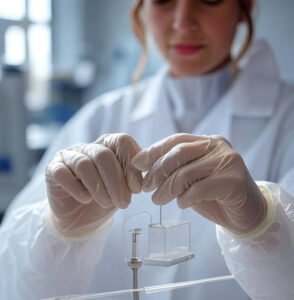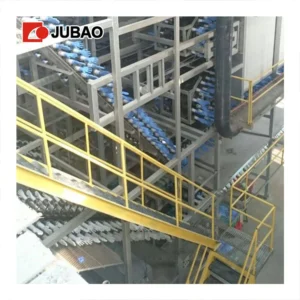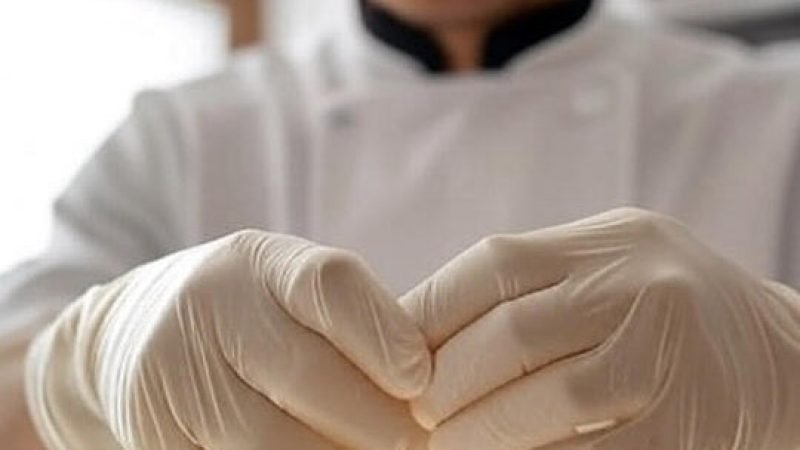What are PVC Gloves Used For? A Comprehensive Guide to Applications and Manufacturing
Table of Contents
Introduction to PVC Gloves
Polyvinyl chloride (PVC) gloves have established themselves as one of the most versatile and widely used forms of disposable hand protection across multiple industries. These synthetic gloves provide essential barrier protection while offering cost-effective solutions for businesses and organizations requiring reliable hand protection equipment.
The widespread adoption of PVC gloves stems from their unique combination of chemical resistance, affordability, and latex-free composition. Understanding the various applications and proper usage of PVC gloves is crucial for safety managers, healthcare professionals, and industry workers who rely on effective personal protective equipment.
Understanding PVC Gloves
PVC gloves are disposable protective gloves manufactured from polyvinyl chloride, a durable synthetic plastic polymer. Unlike natural rubber latex gloves, PVC gloves are completely synthetic, eliminating concerns about latex allergies and protein sensitivities that affect a significant portion of the population.
These gloves maintain flexibility and tactile sensitivity while providing reliable barrier protection. The material’s inherent properties make PVC gloves suitable for both short-term and extended wear applications, depending on the specific workplace requirements.
PVC Glove Manufacturing Process
The production of high-quality PVC gloves requires sophisticated manufacturing equipment and precise process control. Modern PVC glove machine technology has revolutionized the industry, enabling manufacturers to produce consistent, reliable products at scale.
The manufacturing process typically involves several key stages:
Dipping Process: Advanced PVC glove machine systems use automated dipping processes where aluminum hand molds are cleaned, heated, and dipped into PVC compound solutions. The thickness and quality of the final product depend on the precision of the dipping equipment and process parameters.
Curing and Vulcanization: After dipping, the gloves undergo controlled heating processes in specialized ovens. Modern PVC glove machine lines incorporate precise temperature and timing controls to ensure optimal material properties and durability.
Quality Control: Automated inspection systems integrated into PVC glove machine production lines detect defects, ensure proper thickness distribution, and maintain consistent quality standards throughout the manufacturing process.
Primary Applications and Uses
Healthcare and Medical Applications
In healthcare environments, PVC gloves serve critical functions for infection control and patient safety. Medical professionals utilize these gloves for numerous routine and specialized procedures.
Specific healthcare applications include:
- Patient examinations and routine medical procedures
- Handling medical instruments and sterile supplies
- Medication preparation and administration
- Laboratory specimen collection and processing
- Wound care and dressing changes
- Dental procedures and oral healthcare
- Physical therapy and rehabilitation services
Healthcare facilities often prefer PVC gloves for their cost-effectiveness in high-volume usage scenarios, particularly for non-surgical applications where frequent glove changes are necessary to prevent cross-contamination between patients.

Food Industry and Food Safety
The food service and processing industries rely heavily on PVC gloves to maintain hygiene standards and comply with food safety regulations. These gloves are FDA-approved for direct food contact, making them suitable for various food handling operations.
Food industry applications:
- Food preparation and cooking processes
- Meat, poultry, and seafood processing
- Bakery and confectionery operations
- Fresh produce handling and packaging
- Restaurant and cafeteria food service
- Food quality inspection and testing
- Cleaning and sanitizing food contact surfaces
The chemical resistance properties of PVC gloves make them particularly valuable in food processing environments where workers may encounter cleaning chemicals, sanitizers, and various food acids during normal operations.
Industrial and Manufacturing Applications
Manufacturing and industrial environments present diverse challenges that PVC gloves are well-equipped to handle. The durability and chemical resistance of these gloves make them suitable for various industrial processes and manufacturing operations.
High-capacity PVC glove machine production ensures adequate supply for industrial users who require large quantities of reliable protective equipment for their workforce.
Industrial uses include:
- Assembly line manufacturing operations
- Quality control and product inspection
- Chemical handling and processing
- Automotive parts manufacturing and assembly
- Electronics and semiconductor manufacturing
- Paint and coating applications
- Maintenance and repair operations
Cleaning and Maintenance Services
Professional cleaning services, janitorial staff, and maintenance personnel extensively use PVC gloves for protection against cleaning chemicals, biological contaminants, and various workplace hazards.
Cleaning and maintenance applications:
- Commercial and residential cleaning services
- Hospital and healthcare facility sanitation
- Educational institution maintenance
- Restroom cleaning and disinfection
- Floor care and surface maintenance
- Waste collection and disposal
- HVAC system maintenance and cleaning
Laboratory and Research Facilities
Research laboratories, testing facilities, and scientific institutions utilize PVC gloves for various analytical and experimental procedures. The chemical resistance and tactile sensitivity of these gloves make them suitable for many laboratory applications.
Laboratory applications:
- Chemical analysis and testing procedures
- Biological sample handling and preparation
- Pharmaceutical research and development
- Environmental testing and monitoring
- Academic research and educational demonstrations
- Quality control testing in manufacturing
Benefits and Advantages
PVC gloves offer numerous advantages that contribute to their widespread adoption across various industries:
Cost-Effectiveness: PVC gloves typically cost significantly less than nitrile or latex alternatives, making them an economical choice for organizations with high-volume glove usage requirements.
Latex-Free Protection: The synthetic composition eliminates latex allergy concerns, making PVC gloves suitable for individuals with latex sensitivities and reducing workplace liability issues.
Chemical Resistance: PVC gloves provide excellent resistance to many chemicals, including acids, bases, oils, and solvents commonly encountered in workplace environments.
Durability and Reliability: Modern PVC glove machine technology ensures consistent thickness distribution and reliable performance characteristics throughout each glove.
Versatile Applications: The ambidextrous design, multiple size options, and broad chemical compatibility make PVC gloves suitable for diverse workplace applications.
Easy Disposal: PVC gloves can be disposed of through regular waste streams in most applications, simplifying waste management procedures for organizations.

Limitations and Key Considerations
While PVC gloves offer many benefits, understanding their limitations is essential for proper application and user safety:
Temperature Limitations: PVC gloves may lose flexibility in extremely cold conditions and can be damaged by excessive heat, limiting their use in extreme temperature environments.
Puncture Resistance: Compared to nitrile gloves, PVC options generally offer lower puncture and tear resistance, making them less suitable for applications involving sharp objects or rough surfaces.
Protein Powder Sensitivity: Although most modern PVC gloves are powder-free, some products may contain additives that could cause allergic reactions in sensitive individuals.
Limited Barrier Protection: PVC gloves may not provide adequate protection against certain aggressive chemicals or biological hazards, requiring careful assessment of workplace risks.
Selection Guide for PVC Gloves
Choosing appropriate PVC gloves requires careful consideration of several important factors:
Thickness Requirements: Different applications may require varying glove thickness levels. Thicker gloves (6-8 mils) offer enhanced protection but may reduce tactile sensitivity, while thinner options (4-5 mils) provide better dexterity.
Size and Fit Considerations: Proper sizing ensures user comfort, maintained dexterity, and effective protection. Ill-fitting gloves can compromise safety performance and user productivity.
Quality Standards: Select gloves manufactured using advanced PVC glove machine technology and quality control systems to ensure consistent performance and reliability.
Certification Requirements: Look for gloves that meet relevant industry standards such as FDA approval for food contact, ASTM standards for barrier protection, or medical device regulations for healthcare applications.
Usage Volume: Consider packaging options and bulk availability, especially for high-volume users who benefit from efficient PVC glove machine production capabilities.
Industry Standards and Quality Control
PVC glove manufacturing must comply with various industry standards and regulations to ensure product safety and performance:
FDA Compliance: Food-grade PVC gloves must meet FDA regulations for materials intended for food contact, ensuring they don’t transfer harmful substances to food products.
ASTM Standards: Various ASTM standards govern testing methods for glove barrier properties, chemical resistance, and physical performance characteristics.
ISO Certification: Many PVC glove machine manufacturers and glove producers maintain ISO quality management certifications to ensure consistent production standards.
Medical Device Regulations: PVC gloves intended for medical use must comply with relevant medical device regulations and undergo appropriate testing and certification processes.
Conclusion
PVC gloves represent a versatile, cost-effective solution for hand protection across numerous industries and applications. From healthcare and food service to manufacturing and laboratory environments, these synthetic gloves provide essential barrier protection while offering practical benefits for both employers and users.
The continued advancement of PVC glove machine technology has enabled manufacturers to produce higher quality products with improved consistency and reliability. Modern production capabilities ensure adequate supply for diverse applications while maintaining strict quality standards and regulatory compliance.
When selecting PVC gloves, organizations should carefully assess their specific requirements, consider relevant industry standards, and choose products from reputable manufacturers who utilize advanced PVC glove machine technology and quality control processes.
As workplace safety requirements continue to evolve and expand, PVC gloves will remain an important component of comprehensive personal protective equipment programs. Their combination of affordability, effectiveness, and broad applicability ensures their continued relevance in protecting workers across various industries and applications.
Understanding the proper applications, benefits, and limitations of PVC gloves enables organizations to make informed decisions about protective equipment selection and implementation, ultimately contributing to safer, more productive work environments.
